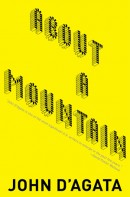A weekly roundup of noteworthy reviews from other sources. It normally appears on Mondays.
 At n+1, Alexander Provan writes a thorough critique of “lyrical essayist” John D’Agata’s new book, which frequently alters facts on a whim: “[D’Agata] seems to forget that the inability of language or representations to capture our experience of the world is a signal problem of art in the modern era, not just a characteristic of the essay—and that tackling this aporia does not in itself qualify something as art, nor make it interesting.” Plus this: “It is often difficult to shake the feeling that D’Agata is addressing those who have paid a large sum of money to have their creative personas validated.” Ouch. . . . In the new issue of Open Letter Monthly, Rohan Maitzen reads Jane’s Fame: How Jane Austen Conquered the World, and wonders if Austen remains a posthumous superstar because of “her representative standing as an icon for a nostalgically imagined past.” . . . Gary Lutz admires a short new book by Jane Unrue about the daughter of a washed-up actress: “With just over one hundred pages, some of them hosting no more than a wee phrase or the clarion burst of a sentence, and most of them giving out well shy of the bottom margins, the novel, though slender, is emotionally thorough, dense but not crammed, and unnoisily original in the bloodbeat and quiver of its prose.” . . . The Economist reviews a new social history of Iceland: “The story is not wholly pleasant. Even readers with strong stomachs will find them tested.” . . . Tim Rutten heaps praise upon Julie Orringer’s first novel, set against the Holocaust: “It’s hard to imagine a fictional setting more heavily strewn with literary and historical mines, but Orringer traverses this perilous rhetorical terrain with remarkable — and, more important, convincing, self-possession.” . . . Not sure when it’s being published in the U.S., but Jonathan Coe’s new novel is out in the UK, and Sean O’Brien has a funny image for it: “Jonathan Coe, acclaimed and admired, seems to have unwritten his novel in the act of writing it, plunging into a canyon like Wile. E. Coyote when he discovers that his tightrope only has one end secured.”
At n+1, Alexander Provan writes a thorough critique of “lyrical essayist” John D’Agata’s new book, which frequently alters facts on a whim: “[D’Agata] seems to forget that the inability of language or representations to capture our experience of the world is a signal problem of art in the modern era, not just a characteristic of the essay—and that tackling this aporia does not in itself qualify something as art, nor make it interesting.” Plus this: “It is often difficult to shake the feeling that D’Agata is addressing those who have paid a large sum of money to have their creative personas validated.” Ouch. . . . In the new issue of Open Letter Monthly, Rohan Maitzen reads Jane’s Fame: How Jane Austen Conquered the World, and wonders if Austen remains a posthumous superstar because of “her representative standing as an icon for a nostalgically imagined past.” . . . Gary Lutz admires a short new book by Jane Unrue about the daughter of a washed-up actress: “With just over one hundred pages, some of them hosting no more than a wee phrase or the clarion burst of a sentence, and most of them giving out well shy of the bottom margins, the novel, though slender, is emotionally thorough, dense but not crammed, and unnoisily original in the bloodbeat and quiver of its prose.” . . . The Economist reviews a new social history of Iceland: “The story is not wholly pleasant. Even readers with strong stomachs will find them tested.” . . . Tim Rutten heaps praise upon Julie Orringer’s first novel, set against the Holocaust: “It’s hard to imagine a fictional setting more heavily strewn with literary and historical mines, but Orringer traverses this perilous rhetorical terrain with remarkable — and, more important, convincing, self-possession.” . . . Not sure when it’s being published in the U.S., but Jonathan Coe’s new novel is out in the UK, and Sean O’Brien has a funny image for it: “Jonathan Coe, acclaimed and admired, seems to have unwritten his novel in the act of writing it, plunging into a canyon like Wile. E. Coyote when he discovers that his tightrope only has one end secured.”

